Town Assessment Boards Axed
County switches to phone-based complaints
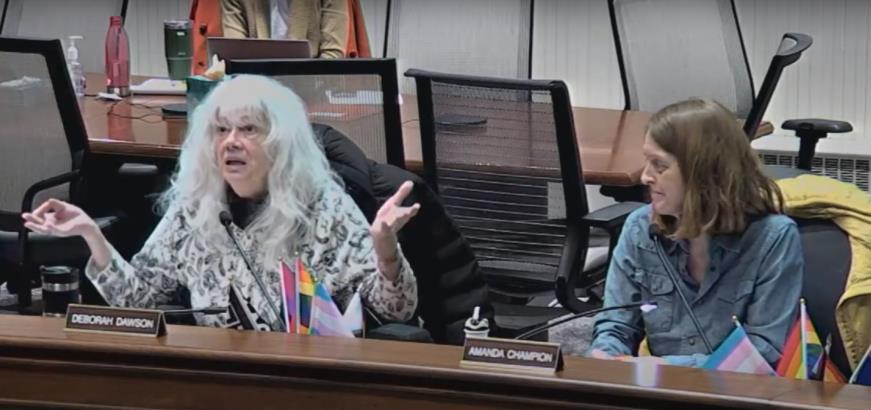
by Robert Lynch, January 18, 2023
Thanks to legislative action Tuesday, the soonest you may be able to look an assessor eyeball to eyeball is on Grievance Day. That is, not until late-May.
Securing the bare minimum of eight votes needed, the Tompkins County Legislature Tuesday indefinitely suspended the half-century-long practice of convening Town-based Local Boards of Assessment Review, tribunals that allowed residents to complain to local officials at their Town Halls prior to Grievance Day’s final assessment decision.
“We believe it’s not the best use of time and money,” Government Operations Committee Chair Amanda Champion explained Tuesday. Her committee had recommended the indefinite suspension.
But that’s only half of the story. At Tuesday’s Legislature meeting, Director of Assessment Jay Franklin revealed for the first time that the “Informal Review Meetings” he’s promoted to replace complaints before the Local Boards will take place this year only by telephone, and no longer in person. As yet, County Assessment has not made provision for zoom conferences.
Franklin advised legislators that the typical “Informal Assessment Review” takes only 5-10 minutes. And to him, it becomes a matter of crowd control.
“Just by handling the amount of people who are coming in and almost cycling through our office, we just don’t have that space,” Franklin told the Legislature.
But mind you, only moments earlier, Franklin had said these words: “We hold Informal Assessment Review meetings each year…. That’s really where we want people to come and talk to us…. People just need to reach out to us and ask us if there’s really any question.”
So assessors want to hear from you. They just don’t want to meet you at the office. Assessors may define “meeting” a little differently than the rest of us do.
This year, Tompkins County may find itself swamped with assessment grievances. Because of skyrocketing property values in many neighborhoods, the Department of Assessment plans to reassess every parcel in the county. In many instances, assessors will “trend” values upward on the basis of sampling. “We will send out 25,000 change notices on February 10th,” Franklin told the Legislature.
All three Republican legislators plus Dryden Democrat Mike Lane voted Tuesday to keep the Local Boards in place. Mike Sigler was among those who would retain the Local Boards.
“These are one of the few times, I think, that we give the public an opportunity outside of this actual building, and outside of downtown, to come and talk with us,” Sigler said. “I see people re-engaging.”
Sigler observed he sees people finally emerging from their self-spun, post-pandemic cocoons.
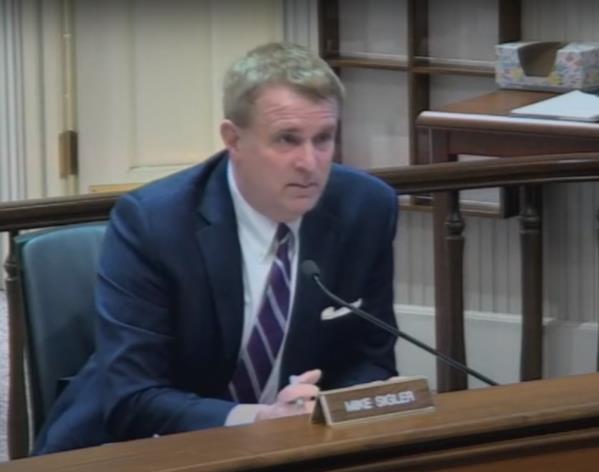
“I think this is an opportunity for people to come and visit us in their local Town Halls and say, ‘Listen, this is the problem I have with my assessment,’” Sigler said in praise of the Local Boards. “It’s another point of engagement.”
But legislator Deborah Dawson would take a pass on engaging over the price of a home. “I don’t see these meetings as an optimal point of engagement between our constituents and us as elected representatives,” Dawson countered. In her opinion, a constituent’s “time is probably more productively used if they go directly to Jay’s office.”
Dawson conceded personal frustration over her inability to connect with those she represents through newsletters or other means. Nevertheless, when it comes to property valuations, she’d leave adjustments to the Assessment Department professionals.
”If you’re out there, talk to me, but not about your assessment,” Dawson remarked.
Dryden’s Greg Mezey agreed with Dawson. In Mezey’s opinion, the time spent by local tribunals that lack any power is time simply wasted. “It doesn’t do anything,” he said.
Local Boards of Assessment Review first convened in Tompkins County more than 50 years ago, beginning when Tompkins transitioned to its unique, centralized, County-administered assessment. For decades, Local Boards provided a degree of deference to hometown oversight.
Each Board, staffed by a Tompkins County legislator, several appointed local residents, and attended by Assessment Department staff, may only recommend assessment changes. By contrast, in late-May, on Grievance Day, the County’s Board of Assessment Review holds actual power to adjust property values in response to an aggrieved owner’s complaint.
After a three-year hiatus, Tompkins County revived the Local Boards during 2022. Officials last year found the Town-based sessions poorly attended. Only 47 properties were grieved countywide during last year’s hearings. Just two people attended Enfield’s session.
Nonetheless, the Enfield Town Board in October recommended the Legislature continue the local Advisory Boards. And during a mid-January Town Board meeting, discussion raised the prospect of Enfield this year assembling a local review panel of its own.
The suspension adopted Tuesday leaves undetermined whether Tompkins County will ever revive the Local Boards. The measure adopted would continue the suspension until either the Department of Assessment or “the appropriate standing committee of the Legislature” determines Boards should return.
###
Maybe Death by Delay
Newfield Advances Moratorium to Block Second Wind
by Robert Lynch, January 13, 2023
Carmen Guidi’s dream of building more than two dozen cabins for the homeless behind his Route 13 collision shop plays far better in the chambers of the Tompkins County Legislature than it does at the Newfield Town Hall, a fact proven again Thursday night.
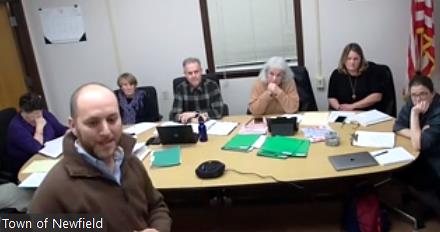
In late-December, a majority of the Tompkins County Legislature refused to drop Guidi’s proposed Second Wind Campsites from a list of local agencies targeted to receive millions from the County’s Community Recovery Fund. The Legislature’s 8-5 vote kept Second Wind in the running to snag $510,000 for its project.
But Thursday night in Newfield, the Town Board showed little support for Guidi’s efforts. Clearly taking the temperature of its community, the Board scheduled an early-February Public Hearing on a local law that would impose a one-year moratorium on “campsites.” The lengthy, lawyer-crafted document, read aloud at the meeting, directly targets Second Wind’s proposal to build its 25 cabins for the unhoused. And because the moratorium, if adopted, would stall any campsite construction until at least spring 2024, the moratorium could make future County funding a moot issue.
The federal moneys that back the Community Recovery Fund are time-sensitive, Tompkins County legislator Randy Brown explained near the end of Thursday’s meeting. Moneys have to be allocated by a set date, he said. And “a moratorium would make it difficult to do,” Brown maintained.
“I don’t feel comfortable in my home anymore,” an online participant who identified herself on her zoom tile as “Pam” told the Town Board during what turned into nearly a half-hour of public comment. “I’m against this,” she said of Second Wind’s expansion. “Nothing would (have) me leave my home faster.”
Pam was among a majority of commenters who addressed the Newfield Board in opposition to the homeless shelters. Three persons spoke in the project’s favor, too. Yet two of them were campsite officials, including Carmen Guidi himself.
Guidi spoke of his humanitarian efforts to help provide the unhoused a second chance at life. He related the story of “Danny,” a homeless man he once befriended in Ithaca’s makeshift encampment, the so-called “Jungle.” Later, Guidi said, he found Danny hanging from a tree, a suicide. Guidi emotionally explained that such tragedies have guided him to provide the homeless a better existence, and do so on his property, right behind his shop.
A second supportive voice: The proposed Second Wind campsites would provide the homeless “safety, warmth, friendship and community,” Dave Shapiro, executive director of Second Wind, told the Town Board. Those already residing at Second Wind’s existing 18 “cottages,” the small, permanent, tiny houses that wrap around the collision shop, “find living in Newfield to be a beautiful thing,” Shapiro said. And the homeless, he added, “do better when they’re brought to nature,” in places like Newfield.
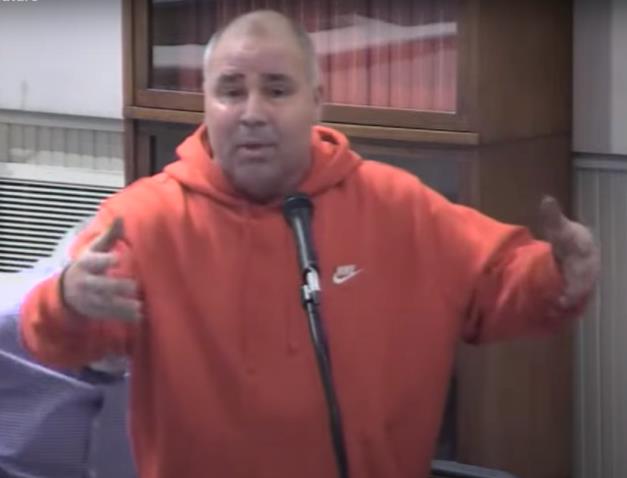
But Shapiro’s was a minority position. Newfield’s critics fear Guidi’s generosity would only export a hefty slice of Ithaca’s crime- and addiction-plagued homelessness problem to their rural community, a hamlet lacking the police presence, the anti-addiction services, or the emergency response times needed to protect both Second Wind’s new inhabitants and Newfield’s permanent residents.
“I sympathize with Carmen,” one Second Wind critic told the Town Board. “His heart is in the right place…. But I’m concerned of a criminal element released into the community,” including pedophiles. “We don’t have services for these people,” the commenter said.
Most disturbing to many are Second Wind’s plans to accommodate at the cabins “low barrier” homeless populations, persons with drug and criminal histories, including past sex crimes.
Anecdotal stories punctuated Thursday’s meeting; complaints alleging that crime spawned by Ithaca’s “Jungle” behind Walmart has spilled into Ithaca’s West End neighborhood. One commenter talked of overdoses and problem patrons reaching as far as the Ithaca Agway. Another alleged he can’t even pay for his gasoline after-hours at Elmira Road’s Byrne Dairy because the store must keep its doors locked for safety. Of the eight who addressed the Board, five urged the Town Board block Second Wind.
****
And indeed the Board will likely do that. As read at the meeting, and then slated for the February Public Hearing, the lengthy, heavily-lawyered proposed local law would place a temporary one-year, town-wide moratorium on the “review or applications for campsites,” as well as the housing they would include and the facilities built to support campsite residents. Violation would carry a $10,000 per day fine.
The local law grounds its moratorium on the “significant concerns of the Town Board” on “health and safety” issues, on maintaining the “rural nature of the Town,” and on “lack of services and long response times.”
The language states a moratorium would allow Newfield an opportunity up update its Comprehensive Plan to address the concerns about projects like Second Wind, and it would allow the Board to enact controls currently unavailable in un-zoned Newfield.
But perhaps most important, the one-year moratorium is strategic. Once it expires, whether or not a new law governing campsites is on the books, the Tompkins County money that many supporters see as essential to expand Second Wind might have evaporated. Some, like legislator Brown, would like to have Second Wind’s $510,000 diverted to other Recovery Fund applications that failed to win an advisory committee’s support. Some of those also-ran applicants find their home in Enfield.
Hand in hand with its move forward toward a moratorium, the Newfield Town Board also Thursday exercised its option to pre-empt the town’s Planning Board from passing final judgment on Second Wind’s site plan. By unanimous vote, the Town Board voted to “take on site plan review” for Guidi’s proposed cabins. The Board had previously also opted to become lead agency on Second Wind’s required environmental review.

A “transplanted tree-hugger community” now populates the Planning Board, one of Thursday’s publicly-commenting critics of Second Wind bluntly alleged.
Newfield Town Supervisor Michael Allinger and his four Town Councilpersons are low-key, never flamboyant, legislators. Like Town Board members of an earlier era, they conspicuously avoided interjecting themselves Thursday into their community’s a thorny debate. They listened. They then acted. They offered little comment that begged for quotation.
“I think it’s going to take time,” Councilperson Casey Powers remarked at one point in forecasting a huge turnout for the February 9th hearing. “My feeling is it’s going to take hours.”
Another Board member questioned whether the Board would need to hold a second hearing should it modify the moratorium’s language after the first hearing had ended.
Attorney for the Town Thomas Smith said unless there’s “drastic change,” a second hearing won’t be needed. What’s “drastic,” he was asked. “You know it when you see it,” Smith replied.
Nonetheless, the Town Board may not be able to adopt the moratorium targeting Second Wind immediately after the hearing concludes. By law, the Tompkins County Planning Department must weigh-in. A 40-day comment window was mentioned, its starting date never clearly defined Thursday. And legislator Brown at a recent meeting openly feared that County staff might attempt to paper-over Second Wind’s blemishes in deference to the downtown lawmakers who support the project.
But the Town Board could still override any County Planning criticism by a super-majority vote, four votes out of five. Judging from Board sentiment Thursday, the bar would not prove difficult to overcome. Not a single one of the five elected to the Newfield Town Board appeared eager that night to have those 25 cabins for the homeless come anywhere near to them or their neighbors. Many in Newfield see homelessness as mainly Ithaca’s problem, not theirs. And yes, it’s also an election year.
###
State Job will limit Redmond’s Enfield role
by Robert Lynch; January 11, 2023; additional reporting January 12, 2023
At worst, she’d have to resign. At best, she’ll need to recuse herself on certain votes. But Enfield Supervisor Stephanie Redmond’s acceptance of a job with New York Assemblymember Anna Kelles will tie her hands at times in handling her Town duties from now on, Redmond revealed to her Town Board Wednesday.
“We’ll see what they’re going to allow,” Redmond said of the State Ethics Commission’s investigation of her dual role and the potential conflicts of interest it might identify.
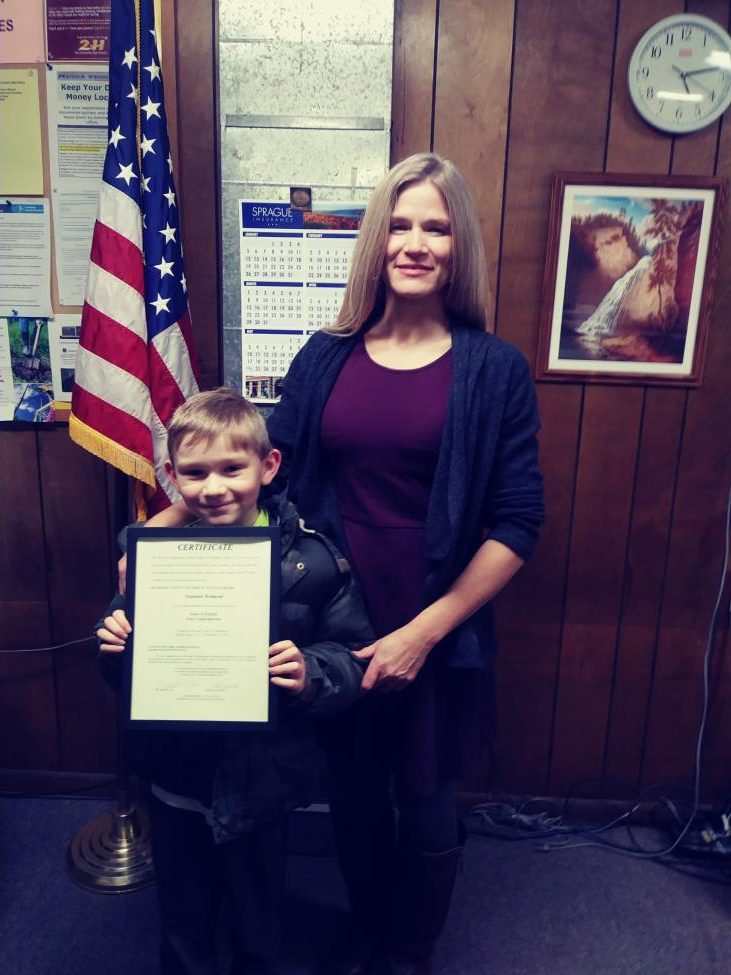
Involvement of the State Ethics Commission sounds worse than it really is. It’s actually standard procedure and ensures that the second-term Supervisor is following rules by the book. The commission will weigh whether actions Redmond takes—especially her votes—could taint her neutrality and objectivity as a legislative employee. The Supervisor cautioned the Town Board Wednesday that the bright-line of separation would almost certainly prevent her from voting on matters that seek to influence state legislation or other action by Albany leaders.
This month, Redmond assumed a part-time position as a legislative aide of Assemblymember Kelles, specializing in matters of environmental policy. Smiling and enthusiastic about her new position Wednesday at the Enfield Board’s first meeting of the year, Redmond said she won’t know until month’s end what ground rules State ethics regulators will place on her local service. Redmond conceded, worst case, they’d force her to choose one job or the other. If that becomes the case, the Supervisor on meeting night did not state which job she’d give up.
It’s been exactly two years since Stephanie Redmond officially took the reins of Enfield Government. Elected Councilperson in 2019, the North Applegate Road wife and mother, best known for her environmental activism, was promoted to Supervisor by her Town Board colleagues in January 2021 during a contentious Board meeting at which two other members threatened to resign—and thereby cost the Board its legal quorum—if the third seated member, Councilperson Robert Lynch (this writer) did not also support Redmond’s appointment.
Faced with the prospect of placing Enfield “dead in the water,” as he then termed it, Lynch agreed to the appointment. Collegiality has grown among Board members since that testy meeting. Voters elected Redmond to a full, two-year term in November 2021, the Democratic appointee then outpolling a write-in challenger. The Supervisor’s current term expires at year’s end.
At Wednesday’s meeting, Lynch advised Redmond to announce her ethics-imposed limitations as soon as she learns of them, and if possible, not wait until the Board’s February 8th meeting. The Town Board has scheduled two rather mundane business meetings between now and then; the first on Friday (Jan. 13), and the second on January 23rd.
Should the Supervisor need (or choose) to resign, the procedures used for Redmond’s own appointment could be employed again. A majority of the four remaining members on the Town Board could appoint a new Supervisor—either one of their own or an outsider—to handle administrative tasks through year’s end. Or the Board could leave the Supervisor’s position vacant either until the November General Election or until a Special Election called for some time before then. In the interim, Deputy Supervisor Isabel Castillo, an appointee, would preside at meetings.
****
With machine-gun rapidity, the Enfield Town Board raced through as many as 27 annual organizational resolutions Wednesday; actions appointing deputies for the Supervisor, Town Clerk and Highway Superintendent, renewing Blixy Taetzsch’s appointment as Town Bookkeeper, and setting dates, times and rules for monthly meetings. The Board, by necessity, again designated The Ithaca Journal as its official newspaper for legal notices, that despite this Board member’s complaint that the Gannett daily never covers Enfield news.
Repeating his annual—and always unsuccessful—appeal, Councilperson Lynch moved to reinstate the Pledge of Allegiance at the start of every meeting, removing its status from recitation by request-only. The Board’s majority had removed the Pledge from the regular meeting order in January 2020. Again, as at the past two organizational meetings, Lynch’s reinstatement motion failed for lack of a seconding vote.
With similar lack of a second, Lynch also failed to attach to a list of annual Advisory Committee appointments a requirement that all committee meetings be open to the public and properly noticed. To answer concerns previously voiced by Supervisor Redmond, Lynch’s motion would have permitted Town Board members not appointed to those committees to attend only as members of the general public and not allowed them to participate except during public privileges of the floor. Lack of action on Lynch’s motion keeps Advisory Committee meetings closed for another year.
Completing perhaps its most substantive organization ritual, the Town Board, following a discussion with Highway Superintendent Barry “Buddy” Rollins, ratified—and members signed—the so-called “284 Agreement,” the yearly financial authorization allowing Rollins to undertake the road repairs he proposes.
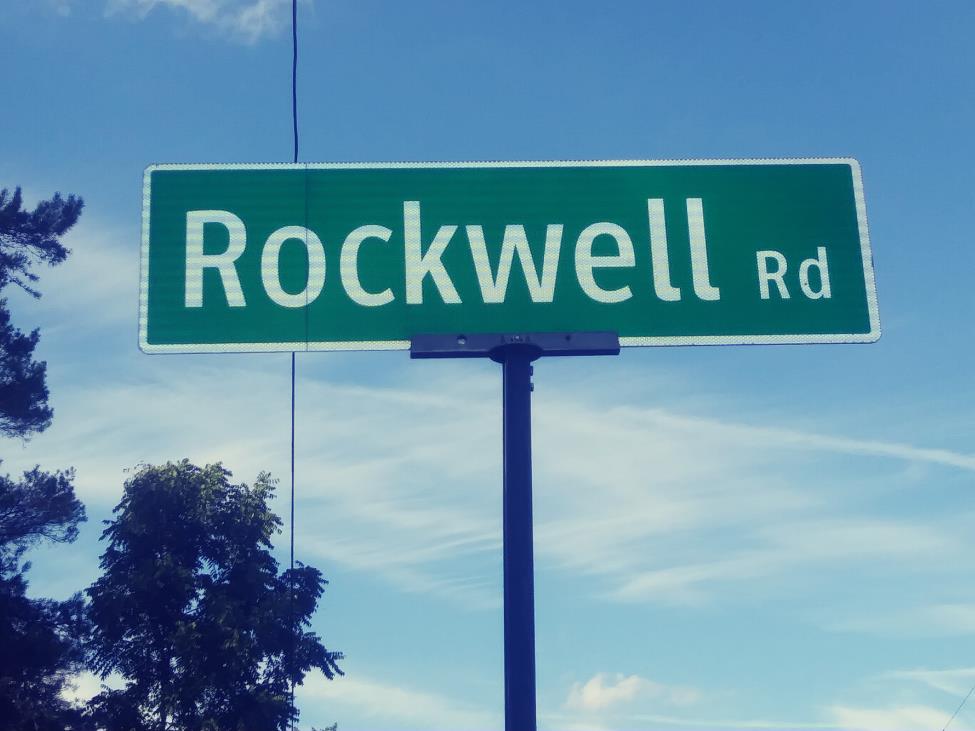
This year, Rollins would give a major make-over to the one-mile, uphill stretch of Bostwick Road, from Route 327 to South Applegate Road, at a cost of $240,000. The approved agreement allots another $85,130 for road repairs Townwide.
Lynch pulled out a five-year road maintenance schedule, last updated in the Town’s late-2019 Capital Plan, and asked Rollins to compare it with work already done. The Superintendent said that some roads, including Griffin, Colegrove and Black Oak, were completed years ahead of schedule. Harvey Hill Road, which the Capital Plan had not set for repaving until 2024, was attacked last year, two years early. The 2019 schedule puts the just-authorized Bostwick Road project one year late. And Rockwell Road, which the plan had called for repaving in 2020, still remains undone. Rollins said he checks Rockwell annually, and that in his opinion, it’s still not too bad.
###
Troubling Times at TCAT
Spring Schedule brings more cuts; rider frustration
by Robert Lynch, January 9, 2023
If you thought things couldn’t get worse for driver- and bus-deprived Tompkins Consolidated Area Transit (TCAT), think again. They will.
The local transit agency’s late-January through May Spring Schedule got its first public airing Monday to TCAT’s Riders Advisory and Accessibility Committee. And what transit officials did most often during that hour-long online session with the agency’s ridership sounding board was to apologize.
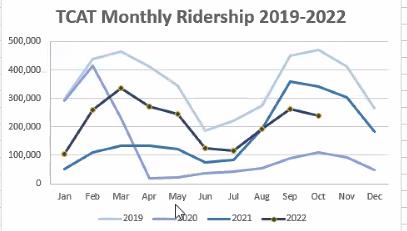
“This is the best we can do,” Erik Amos, TCAT’s Manager of Service Development and Planning, told committee members, concerning the schedule.
“We hope we can work through this. It’s a very, very tough time,” Patty Poist, Manager of Communications and Marketing, said at another point in the meeting.
The problem facing TCAT is not necessarily declining demand; it’s a supply-side crisis. People may want to ride the bus. Their problem comes in finding one to ride; one that both works and has someone at the steering wheel.
Figures shown the committee Monday reported local ridership is dropping by as much as 30 per cent a year. While some of the decline may arise artificially due to problemsome, error-prone fare boxes that don’t report every passenger, the primary cause is likely TCAT’s ever-deeper, necessity-driven service cuts. When it comes to the TCAT bus, “people are not riding it as much,” Amos admitted.
While the deepest cuts will impact many routes close to the Ithaca City hub, TCAT’s rural routes will suffer relatively less this spring. Route 20 to Enfield, which TCAT trimmed last fall, including the elimination of its Sunday service, will not face further cuts this spring… at least not for the moment.
“(Cutting) rural route cuts don’t really save us a lot,” the Service Development Director said.
The springtime schedule will eliminate two Cornell-centric routes (83 and 92), and the Route 53 run linking downtown and Cornell with Varna and Ellis Hollow. But nearly a score of other routes this spring will face service reductions or at least timing changes.
And expect big changes after dark. Amos reported that service on “most routes”—yet not all—will end at 8 PM. A few routes will run later. Some will cease at 7:15 – 7:20, he said. The popular Route 10 circulator between the Commons and Cornell will see its last trip at 4:10.
“We’re trying to save buses and drivers and make it more efficient,” Amos said about the service’s short-term downsizing. “We had to cut where we needed to cut, and that means elimination of two Cornell routes,” he stated.
While Poist reported that TCAT is “down 20 drivers” at present, the biggest gremlin that’s snarling the service is bus breakdown. TCAT either lacks the mechanics to fix its fleet, or it simply can’t procure spare parts amidst the post-pandemic supply chain logjam.
During October alone, the most recent month with complete figures available, TCAT tallied 705 missed trips assigned to bus shortages. Another 26 cancellations were blamed on driver shortages. And 44 missed trips were because both driver and bus were unavailable.
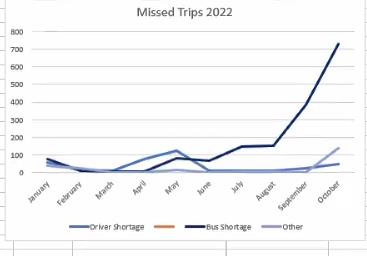
“We’re fighting this on all fronts,” Poist told the committee. “It’s slow and it’s agonizing. We apologize.”
At least one Advisory Committee member voiced skepticism. Suzanne Burnham questioned whether the “priorities of the two colleges are taking precedence over the concerns of workers and commuters.”
TCAT officials waved off the suggestion, though Poist acknowledged reality. “Cornell is the biggest employer, so it’s a balancing act,” she said.
“We’re trying to service where the riders are and where the need is,” Amos added.
TCAT had planned to vet its spring schedule in a January 5th public hearing. But agency officials canceled the hearing in late-December saying the “uncontrollable circumstances” facing the agency tied their hands and, in effect, made the hearing a waste of time.
“We apologize with the full understanding that the tough decisions we have been making over the past year and now into the New Year create more disruptions and inconvenience to our riders,” TCAT General Manager Scot Vanderpool said as he first rolled out the spring reductions just before January first. “But our main task is to create and publish schedules that they (the riders) can rely upon.”
Advisory Committee member Blaine Friedlander lamented Monday that local transit cutbacks come at the same time the needed broader goal should be to curtail automobile traffic and get people onto mass transit to rescue the environment. TCAT may have too few buses and drivers at the moment, Friedlander conceded, yet “we’re not making any accommodation for real situations,” he complained.
The spring TCAT schedule will begin January 22 and run through May 27.
###
Into the Weeds with Breezy Meadows’ Review
by Robert Lynch, January 7, 2023
The shock wave may have passed. But now the heavy lifting begins.
The New Year’s first meeting of the Enfield Town Planning Board Wednesday brought with it far less surprise than did its last meeting of 2022, the session when neighbors grabbed nearly every seat in the room to learn more—and voice concern—about the suddenly-sprung subdivision that alarmed them; Land & Lakes Development’s proposed “Breezy Meadows Farm” 33-large lot subdivide of a nearly 340-acre tract between Halseyville and Podunk Roads. Anonymously-circulated flyers placed in mailboxes in early-December had first warned neighbors of the developer’s plans.

But now, one month later, the dust of controversy has settled a bit, as Enfield planners launched their laborious, multi-meeting review of developers’ plans that remain very much in the incubation stage.
And maybe “incubation” is an apt term of art. The Breezy Meadows tract would include the long-abandoned Babcock Hatchery poultry barns east of Podunk Road. The barns were subsequently, briefly used to raise swine. But all are now vacant. A few have junk in them, and others are simply falling in.
“This is a big project, and it’s going to be important to the people of the Town for many, many years,” Enfield Planning Board member Mike Carpenter told fellow planners at the January 4th “sketch plan conference” with Land & Lakes’ officials.
The conference became the Planning Board’s earliest round of detailed review. Planners raised questions for nearly an hour and a half. Land & Lakes Project Manager Alan Lord provided the answers. Fittingly, they were sketchy as well. Lord must still survey the lots. The Planning Board expects to review a “preliminary plat” of the development in March. The Board’s timetable would delay a Public Hearing on Breezy Meadows until April at the earliest.
Whether neighbors preferred to bide their time, or simply lacked knowledge of Wednesday’s meeting, few turned out for the Breezy Meadows’ discussion this time. Only about a half-dozen attended. A few asked questions, yet they stopped short of voicing outright opposition.
So Board members took the lead. For some, Tucker Road became a concern. A lightly-traveled gravel crossway that would slice through the development, Tucker has only a handful of houses bordering it now. But Breezy Meadows, as it’s now sketched, would front nearly two dozen lots on the road.
“There’s issues with the road,” Planning Board Chair Dan Walker said, relaying a recent appraisal by Enfield Highway Superintendent Barry “Buddy” Rollins, who did not attend Wednesday’s meeting. “It’s not a very stable road when it’s wet,” Walker quoted Rollins as saying. Walker agreed. “There’s going to be impact on the road, ” the Board Chair said.
The Breezy Meadows sketch map stuck in mailboxes a month ago had depicted lot lines quite precisely chopping up the former farm, now owned by the John William Kenney Revocable Trust. Expect those initial boundaries to remain quite the same as first drawn, even after surveyors complete their work.
“There’s not a real good way to move the subdivision around,” Alan Lord told Enfield planners. Lord has tried to keep lot lines traveling existing hedgerows as much as possible, though the attempt limits flexibility. The current layout would place the largest lots on the development’s west side, where the former Babcock barns stand. Lot sizes throughout would range from three acres to as large as 32.
“We will be investigating the buildings,” the project manager assured the Planning Board concerning the Babcock barns. “I hope somebody would use those.”
Yet, in some instances, future use could prove a problem. Walking through the brushy, overgrown site last month (before its owners’ representatives evicted him), this writer observed roofs had fallen in on several structures, and many barns stood in a decades-long state of disrepair.
It’s possible Planning Board approval might hinge on barn demolition. And there could be further demands that allow only the right kinds of animals be raised in the barns that survive.
They could be used for “raising chickens again,” Walker recommended to the Board. “I don’t think we want anybody raising pork again.”
****
But by far, the majority of Planning Board discussion Wednesday centered about a model deed covenant that Land & Lakes purportedly would attach to every property it sells. And the ensuing discussion charted a circumlocutory path toward a new breed of land use control in un-zoned Enfield.
“You are potentially zoning the Town of Enfield in the lots you’ve sold,” Board member Carpenter observed as he viewed the proposed covenants. It’s “zoning through the back door.”
Nonetheless, Carpenter cautioned, “I’m a little iffy about doing partial zoning in the Town of Enfield.”
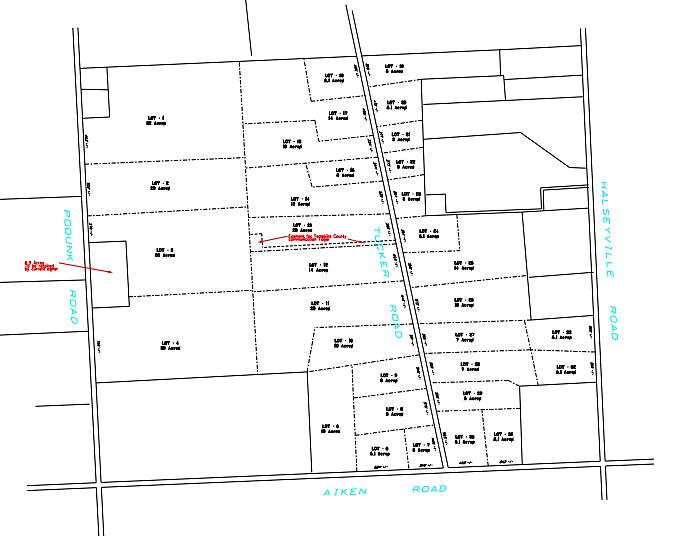
And Dan Walker then offered his own opinion. “I don’t think a majority of those in the Town of Enfield want zoning,” he said.
Alan Lord admitted that the proposed deed restrictions he shared with Enfield Planners were cut-and-pasted from a Dryden tract his firm recently subdivided, a 42-lot, 900-acre project, still largely unsold, but situated in a more tightly-regulated community.
The proposed Breezy Meadows covenant adapted from Dryden would, among its 18 restrictive paragraphs, prohibit “single wide manufactured homes.” It would bar purchasers from further subdividing their lots, restrict camping trailers to a 90-day stay, and require the buyer to maintain the purchased lot “in a good and sanitary condition.”
One of the Dryden project’s more intrusive rules would keep outdoor lighting “to a minimum,” and where necessary, direct light to the ground. Lord said those in Dryden wanted “to protect the night sky.”
Rules are good, planners acknowledged. But who enforces them once they’re written? And can the Town of Enfield, itself, undertake enforcement?
Apparently, it cannot. In an advisory opinion Town Supervisor Stephanie Redmond promptly secured from legal counsel, the attorney advised Enfield officials that while private parties can enforce deed covenants in court, governments generally lack the authority to do so.
“We want to protect values and our reputations,” Alan Lord told the Planning Board, indicating that Land & Lakes might enforce its own covenants, though its Managing Partner, Bob Lesperence, also attending Wednesday’s meeting, said enforcement generally comes through informal contact, not court action.
And while New York State, Land & Lakes, or another subdivision purchaser could initiate litigation, a “neighbor across the street” could not, Board members were told.
Mike Carpenter generally liked the covenant-based restrictions Land & Lakes put forth. Yet Carpenter wondered whether Lord’s firm could reach beyond what it’s written.
What about an energy efficiency clause, Carpenter suggested; one that would set an efficiency standard one step beyond the state’s building code? “I’d like to encourage better housing to be built,” Carpenter explained.
Expect more discussions about Breezy Meadows in March.
###
Freshman Fervor; Newfield’s Maverick
Randy Brown makes his mark defending hometown interests
Reporting and Analysis by Robert Lynch, January 4, 2023
Republican Randy Brown beat me in the 2021 race for the Tompkins County Legislature. He also beat Democratic nominee Vanessa Greenlee. Strange as it may seem, in both instances, even in my own, I’m glad Brown won. What I’ll write next will tell you why.
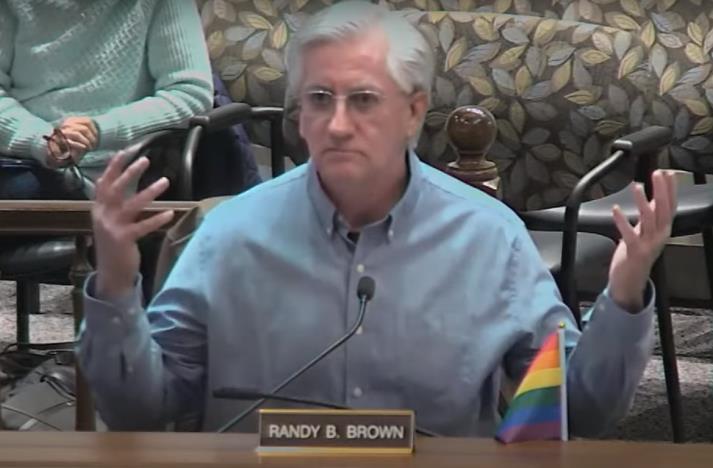
As much as I, myself, might have been—and most assuredly, he’s been so far more tactfully—Randy Brown has become a maverick; the County Legislature’s fiercest defender of the needs and desires of the specific corner of Tompkins County that he represents. In Randy’s case, it’s the towns of Enfield and Newfield. In the role he’s chosen for himself, Randy Brown stands apart. True, he runs the risk of becoming an outcast. And some have derided his approach as being too “parochial.” But no doubt, if asked, Randy Brown would double-down on his conviction. He’d tell you he’s only doing what he was elected to do. And I agree.
At the County Legislature’s first meeting of 2023, the one this past Tuesday night, an organizational session at which leaders are anointed but little else gets done, Randy Brown made it clear he had not forgotten December 20th; the night of the Legislature’s previous meeting. It was the meeting during which every other County lawmaker voted in favor of parceling out more than six million dollars of federal pass-through moneys to more than four dozen commercial, governmental, and non-profit applicants. Yet not a single dollar of that Community Recovery Fund went to any applicant from Enfield. Randy Brown has a problem with that.
“Ultimately, I represent the people in my district, in Newfield-Enfield, and I really struggle with; why am I here?” Brown asked rhetorically as he exercised his privilege-of-the-floor opportunity Tuesday. “It’s a complete failure on my part that they got nothing,” Brown said. “Enfield got nothing. It’s my failure. It’s our failure.”
Then Brown pivoted to the plight of his home community of Newfield, for which the Recovery Fund Advisory Committee—and subsequently the full Legislature—denied Newfield’s biggest municipal reach, $250,000 to underwrite a Town and school district collaborative for “Creating Community Spaces,” upgrading recreation facilities.
“Newfield, in their mind, got kicked in the teeth in the process,” Brown said.
What’s more, the only big money application the Advisory Committee targeted to fund in Newfield was one that many community leaders have strongly opposed. It’s the half-Million dollar request by Second Wind Cottages to build campsites for the homeless in a field behind Guidi’s Collision Shop. The project’s still pending. And many in Newfield fear it will only serve to transport Ithaca’s homelessness problem to their own, ill-equipped hamlet.
Several advocates spoke before the County Legislature Tuesday in favor of Second Wind’s yet-to-be-decided application. But before the Legislature provides it funding, Second Wind must survive a grueling environmental review, one in which Newfield’s own leaders may take the lead. The review could spell deep trouble for Second Wind.
Enfield applicants that have so far been snubbed by the Advisory Committee, and subsequently by the full Legislature, include the Enfield Community Council, whose $206,000 request slipped just five notches below the committee’s cut. The Enfield Volunteer Fire Company also sought money, as did the Enfield Food Pantry, whose $1.66 Million maximum ask became the Recovery Fund’s most expensive item. The pantry never got beyond first-round committee review.

“I’m going to look at legislators differently that voted against Newfield,” Brown cautioned colleagues Tuesday. He put anti-Enfield sentiment in that same, always-be-skeptical category.
And though some may have overlooked it, Brown had already put his words into action that night. When the name of Recovery Fund Advisory Committee Chair Dan Klein was placed in nomination to become Vice-Chair of the Legislature, Brown quietly raised his hand in opposition to Klein’s promotion. Brown was the only legislator shown to object, though he spoke nothing about his vote, nor did he offer an alternative candidate before he voted. Clearly between the two lawmakers, bad blood flows.
During Tuesday’s floor privileges, Randy Brown repeated his argument that the six-legislator Advisory Committee held too much power when it apportioned Recovery Fund moneys. And he believes that the entire County Legislature accorded the committee too much deference in ratifying its recommendations last month without a single change.
“I received over 25 emails and phone calls since the vote on the 20th,” Brown said, “and none of them were good.” (Full disclosure: this writer-Councilperson was among those who emailed legislator Brown.)
“People are so disappointed,” Brown continued. “And some of them feel they were disregarded completely.” Then the District-8 GOP freshman legislator took his grievance one step further:
“And that really goes to this history of how Enfield-Newfield feels,” Brown observed. “This isn’t just this ARPA thing,” referencing the federal funding pot from which Community Recovery funds are drawn. “No, they feel and I feel that the County has not really considered Newfield and Enfield. And maybe other people feel that way as well.”
Randy Brown’s status as his district’s front-line defender did not go unchallenged Tuesday. And the strongest counterpoint came from the Advisory Committee chair he’d voted against, Danby’s Dan Klein.
“We did not take geography into account,” Klein insisted regarding his committee’s selection of winning Recovery Fund applicants. In terms of Enfield and Newfield, he said, “We do not ignore these towns (or) any towns. We represent the entire county, and serve the entire county, and we look for opportunities to do things in any community that needs assistance, needs some services, and that falls within the parameters of what we can do.”
Klein reiterated his previous claim that not only did Enfield lose out on funding; but so did Groton and his home turf of Danby. Of course a critic might point the blame for those towns’ losses at their own representatives, like Klein, who failed to patch local potholes first.
The Advisory Committee Chair also claimed that approximately 40 per cent of Recovery funds went to agencies that lacked a geographic base. He rattled off as many as seven such grant recipients, ranging from Suicide Prevention to TC3. But in all but two instances when Klein pointed out that the agencies still serve Newfield, he failed to mention that they serve Enfield as well.
Before he had ended his rebuttal, and with a discernable bite in his voice, Dan Klein took his argument directly to Brown. He specifically cited a 2021 decision that had earmarked countywide money to fund a broadband extension in Newfield, a subsidy that brought high-speed Internet to 175 homes.
“If you’re going to say that the Town of Newfield is disregarded,” Klein needled Brown, “can you at least subtract 175 households, please.”
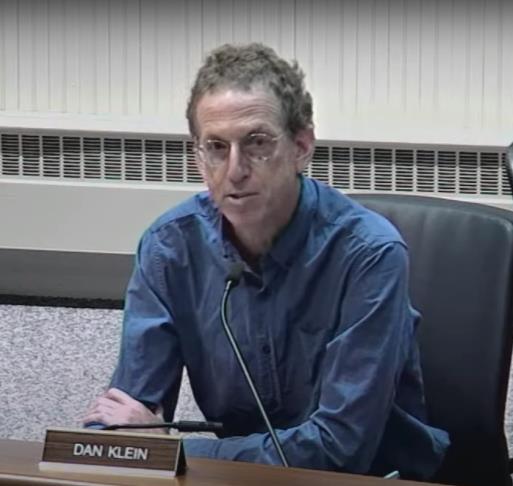
Clearly, though the two men’s districts touch each other, there’s no love lost between Randy Brown and Dan Klein.
And the “county interests come first” argument, advanced by Klein, resonated with others.
“I wanted to commend Dan for pointing out that a lot of the grants that we gave while they’re not specifically targeted towards particular towns and villages, they do serve the entire county,” Lansing’s Deborah Dawson, who sat with Klein on the Advisory Committee, stated in affirmation.
“And I want to caution my colleagues not to be tremendously parochial in their voting,” Dawson warned. She claimed that the villages she represents, Cayuga Heights and Lansing, received no awards from the Community Recovery Fund, either.
Yet understand the difference: Dawson’s two villages, according to the U.S. Census, lie within the Ithaca Urbanized Area. The Towns of Enfield and Newfield do not.
“Randy, I hear you,” the Ithaca City’s Rich John acknowledged, “and I understand you’re reflecting the views of people in your community, and you’re supposed to do that.” Yet John joined Klein and Dawson in stressing the need for a county-wide vision.
“I represent a City district,” John stated. “But I’m here because we are one county. And it’s always important to look at your district, but you also have to look at the whole county.”
Rich John pointed to the Legislature’s inclusion in the 2023 budget of more than $100,000 to lay the groundwork for an EMS “flycar” service, one whose beneficiaries are primarily rural.
“It hurts me to hear the message that people think that the rural areas are totally ignored,” Rich John told Brown. “I really think that we need to look at things as a whole community, a whole county.”
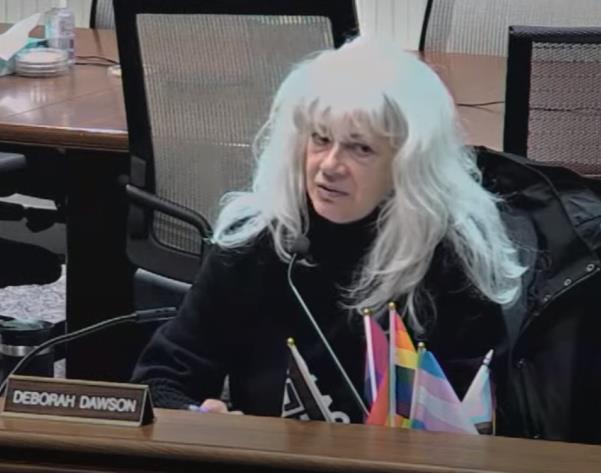
The Town of Enfield’s second County legislator, Anne Koreman, was among those who sat on the Advisory Committee. Though she initially supported many of Enfield’s applications, she later endorsed the committee’s final recommendation both in the committee and on the Legislature’s floor. Koreman has voiced greater support for the final funding decisions than has Brown. And she opposed nearly all efforts on December 20th to amend the recommendations and cut funding to other programs so as to potentially enable an Enfield applicant to slip-in under the wire.
“We did the best we could,” Koreman reflected Tuesday regarding the committee’s past deliberations, a task she described as “challenging.”
“We could go back and second-guess a lot of different things,” Koreman acknowledged. “And could we do more in the community? Sure, there’s always more to do.”
But for the moment, the Ulysses Democrat said it’s best to leave the funding decisions where they stand, identify “some gaps,” that need filling, and fill those gaps from other funding sources.
****
When Republican Randy Brown campaigned for County Legislature in 2021, legislators Klein, Koreman, and Dawson were among a group of five who banded together and endorsed Democrat Vanessa Greenlee for the seat, first in the Democratic Primary against me; and later, in November, against Brown. Had Greenlee won the General Election, one can imagine a much different personality in the District 8 seat, and a less confrontational response to the funding disappointments that Enfield and Newfield have now suffered. Party loyalty and personal camaraderie would likely have dissuaded Greenlee from raising the pointed complaints that Randy Brown now feels free to field. She would have deferred to the friendly faces who’d endorsed her. She would have gone along to get along. My assumption alone; no one else’s.
Election outcomes do matter. And in Randy Brown’s case, it has.
###
Solar Farms vs. “Farm-Farms”
Enfield Board tightens Solar Law; more changes may lie ahead

by Robert Lynch; January 3, 2023
In one pithy phrase during the Enfield Town Board’s final meeting of 2022, this Councilperson (who wrote this story) summed up public perception of solar farms in the Town of Enfield: “People don’t like what they see.”
And during that post-Christmas session, convened explicitly to adopt revisions to the Town’s 2019 Solar Law, collective concern quickly shifted away from the 16-page document that the Board voted to adopt. Instead, it pivoted toward further revision, potential changes that would limit how invasively solar panels may intrude onto agricultural land, or perhaps in the extreme, whether maybe Enfield should ban new industrial solar farms altogether.
The Town Board’s December 27th unanimous vote put an end to a year-long Enfield moratorium it had imposed to suspend the permitting of new, large-scale commercial solar installations in the town.
The Board’s earlier action was rooted in experience. In 2021, the Town Planning Board authorized Enfield’s largest proposed solar farm to date, the 15 Megawatt Norbut Solar Farm across from Johnny’s Wholesale on South Applegate Road. For the past year, however, Norbut Solar has delayed construction, developers citing supply chain problems. As the Town Board amended the law that Tuesday night, it did not state whether the adopted changes could be applied to Norbut retroactively.
Yet the Norbut shadow hung over the Board’s half-hour of deliberations prior to its vote. After Norbut had secured its Planning Board permit, the firm quickly called in a logger to strip the site of nearly all its trees. It left logs by the roadside for more than a year. Woodsmen abandoned the site with wood shavings in cone-like mounds on the hilltop. In ways, it resembled the lunar surface. And whereas the prior owner had once farmed much of the land, Norbut allowed the field to grow to weeds throughout 2022.
“I’m sorry,” Councilperson Robert Lynch told the Town Board. “That operator came to us, and he expressed good intentions. He indicated he was going to be a good neighbor. And since we gave him the permit, in my opinion, he has not been a good neighbor.”
Lynch continued, “I called last winter to say, please, remove those logs that you’ve got near the road right-of-way. They took some away. They didn’t take them all. There’re some still there. And there are piles of wood shavings up on the hill. They could have done right. They can’t get the solar panels this year. That’s a supply chain problem. But they could have at least hired somebody to come in and mow down the goldenrod, take away the logs, and make it look respectable. And they did not.”
Largely because of those concerns—and his stated perception that many in Enfield have now soured on large-scale solar—this writer, Councilperson Lynch, resubmitted a retooled proposed further amendment to the revised solar law.
Scripted in an attempt to impose pinpointed land-use regulation within un-zoned Enfield, the amendment would have sought to prevent a solar operator from wasting away the 40 per cent of a solar farm’s site that Enfield’s 2019 law demands a developer keep free from solar panels. The new amendment would have demanded that the 40 per cent “residual acreage” remain in agricultural use or be kept mowed annually as undeveloped green-space. A solar operator would need to document compliance.

After discussion that dominated most of the half-hour devoted to the Solar Law, Lynch withdrew his amendment, but only after colleagues assured him that the Board would consider his tightened controls later.
“I don’t want us to put this Solar Law on the shelf and forget about it for another two or three years,” the Councilperson said. “I want us to actively work on that because that is becoming a concern for the community about the handling of residual acreage.”
Despite the year-long moratorium’s impact in preventing new commercial operators from approaching the Planning Board for approval, the moratorium has not delayed smaller, residential solar construction.
In December 2021, the Enfield Town Board, with little controversy, imposed an initial six-month halt to accepting applications for new commercial solar farms. The Board tacked on another six months to the moratorium last June.
The Town Board acted after the Tompkins County Industrial Development Agency (TCIDA) in the summer of 2021 granted Norbut Solar Farms tax abatement, a so-called PILOT Agreement, that permitted Norbut to pay less property tax than its assessed valuation would otherwise have demanded during the PILOT’s 30-year life. At the same time, the TCIDA refused Enfield’s request to impose upon Norbut a “Host Community Agreement,” a separate provision that would have demanded Norbut also compensate the Town over and above its PILOT payments. The TCIDA divides PILOT revenues three ways, of which Enfield was told it would get about 28 percent. Many in Enfield Government thought 28 per cent was too little.
But the Solar Law revisions adopted last month by the Town Board would affirm the Town of Enfield’s right to demand from any solar operator Host Community compensation.
“As a condition to the issuance of a Solar Permit, the applicant shall enter into a Host Community Agreement that is mutually agreed upon between the applicant and the Town Board,” the Solar Law’s newly-emplaced paragraph F-B-9 clearly-states.
“The Town Board shall retain the right to enter into said agreements with the applicant so long as they remain consistent with NY State law, notwithstanding the actions of any other governmental agencies or authorities,” another section specifies. Its language restricts the TCIDA’s potential veto power.
Other deeply weed-wandering changes in the Solar Law would expand public and governmental oversight should a solar farm operator cease or deeply curtail power production, and the Town then saw fit to dismantle the site.
****
The revisions scripted for adoption December 27th brought little discussion. Instead, Board members looked beyond what they’d drafted; they focused on how solar farms may have degraded—or will likely degrade—the “rural character” of Enfield that the Town’s Comprehensive Plan, adopted in 2020, had sought to protect.
Supervisor Stephanie Redmond said she’d go so far as to propose an all-out ban on new commercial solar farm permits until the Town exhausts just about every other solar generating opportunity.
“I honestly think we should take it further,” Redmond said, “to actually stop these large industrial solar farms from coming to our town until we have absolutely distributed energy on every single house, on every single building and every single parking lot, brownfield, things like that, and don’t allow them to take over our farms.”
“I don’t know if you ever talked to the environmental lawyer if that’s even legal for us to consider, to stop these industrial farms from coming in here,” Redmond inquired of other Board members.
Councilperson Jude Lemke chairs the Town’s Renewable Energy Advisory Committee. The committee has for the past year crafted the Solar Law’s revised language at meetings closed both to the public and to most other Town Board members. Lemke’s worked closest with the environmental lawyer, Dan Spitzer, whom the Town Board retained in October. And based on her discussions, Lemke, herself an attorney, questioned the legality of either the amendments Lynch proposed or the more sweeping prohibition Redmond hinted she might someday seek.
“I’m not a land use lawyer by any stretch of the imagination,” Lemke qualified. “But you can regulate where things can go in the Town. You can’t, in general, prohibit activities in the Town.”
“There are times when there are health and safety issues where you can—you know maybe the fracking—where you can do that,” Lemke added, addressing Redmond’s suggested ban. “But really you can’t just say we don’t want this in our town, and you can’t build this in our town. You can say we don’t want this in this part of our town. And you can build it here, but you can’t build it there.”
And Lemke also questioned Lynch’s more tempered proposal to mandate either farming or green-space maintenance on a solar farmer’s panel-free acreage.
“We don’t have zoning,” Lemke observed. “And there’s nothing that says we can prevent people from letting their land, you know, grow over with weeds or whatever they want.”
“We don’t have a law that allows us to tell someone you can’t just let this vacant land grow wild,” Lemke continued.
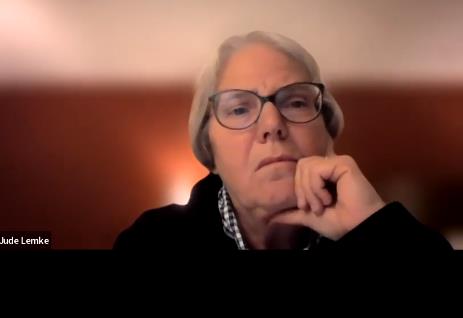
“I have a hard time wrapping my arms around that,” Lynch reacted to Lemke’s reservations. To Lynch, the “solar farm” should rightly include not only the land a farmer might lease to the solar operator to develop, but also the “residual” 40 per cent that Enfield’s innovative 2019 Solar Law requires be kept undeveloped. Lynch maintained Enfield’s Planning Board should hold power to regulate use of the residual land whether it’s within the solar operator’s leased area or retained by the landlord-farmer.
“As I see it, to make that 60 percent coverage rule have any teeth in it whatsoever, you’ve got to consider both the solar area and the residual area in the permitting process,” Lynch responded. “And if the law isn’t written that way, maybe we should redraft the law to encompass that.”
Lynch drew the comparison between unregulated agricultural or residential property owners in Enfield and farmers that rent to solar companies.
“It’s not the same thing as Doug Gunning’s farm up on Harvey Hill Road, where you don’t have to tell him to mow his field because there’s no permitting process needed for a farm,” Lynch argued. “There’s no permitting process needed for Stephanie Redmond and her husband’s house, so you don’t have to tell them that they have to mow their yard every week,” he continued. “But this is different. This is a solar farm that includes 60 percent coverage maximum with solar panels and 40 per cent something else. And why can’t the Planning Board regulate that something else?”
Unlike solar laws in many other towns, Enfield’s 2019 Solar Law imposes what’s called a “lot coverage” requirement.
The Enfield law states that: “The enclosed or fenced in area of a Large-Scale Solar Energy System shall not exceed 60% of the lot on which it is installed.” However, neither before nor after its latest revision does the law explicitly define what constitutes “the lot on which it is installed.” Redefinition could prove key in implementing any tighter controls for the undeveloped acreage.
Nonetheless, in Norbut’s case, the Rochester-based developer has chosen to own its entire site; that both on which it would place its solar panels and set-aside its residual acreage. In securing Planning Board approval, Norbut hop-scotched its panels about its holding so as to skirt identified wetlands. Norbut officials have never stated specifically how they’ll use their remaining acreage. They’ve hinted at times they might use the land’s road frontage for housing, or maybe even a food scrap processing facility.
At a mid-December Public Hearing on the Solar Law’s current amendments, one Enfield resident told the Town Board she opposes residential or commercial development on the 40 per cent of land a solar farmer must set aside. The resident, who lives near one existing solar farm and also close to fields off Podunk Road that may become a future solar farm , said she’d prefer only forests or fields, not buildings, on residual land. After that hearing, Councilperson Lynch redrafted his proposal to answer that resident’s call for open space.
“I remember when people like Beth Magee and Mimi Mehaffey were talking—and Jude Lemke were talking—about these laws back in 2019,” Lynch recalled. “There was this concern; we want to make sure that we keep the rural character of Enfield consistent with our Town Comprehensive Plan. And this is what this is trying to do,” Lynch reminded the Board.
“I don’t disagree with the concern that everyone is raising,” Lemke acknowledged. “I do think maybe we need to put together some sort of committee to take a harder look at all this, and not just the Planning Board, but broader than the Planning Board.”
“But I don’t think this language works,” Lemke spoke to the amendment Lynch had advanced.
Lemke’s broader observation could, of course, expand the scope of land use regulation far beyond only solar farms. It could lead to Enfield’s adopting its first zoning law. Both Supervisor Redmond and Lemke have talked of increased land use control in recent months. Yet no one on the Town Board has come out in favor of zoning, a highly-volatile topic in Enfield.
“I think we should adopt this as it is and keep working,” Redmond said of the solar revisions the Board had on its late-December table. She rejected Lynch’s short-lived proposal that the Board extend the moratorium still further to allow members to attack the broader issues. Yet the Supervisor added, “I really do want to think how we can have land use management policies that are reflected in our Comprehensive Plan.”
So, the Solar Law stands amended. The year-long moratorium is over. But expect more discussion—and possible further amendments—in the months to come.
“We’re going to continue to work on this idea for the residual acreage and how we can manage it so that we don’t have more wasteland in this town,” Lynch promised, as he readied to cast his affirmative vote on the revised Solar Law. “Townspeople, we hear ‘ya.”
###
January News Briefs:
Whistling Past the Graveyard:
(Jan. 27): If you can believe it, the City of Ithaca’s planner charged with economic development said this to The Ithaca Voice: “It is an exciting time for economic development in the City of Ithaca.”
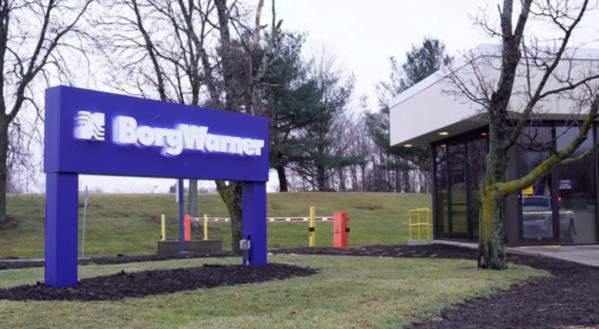
Tom Knipe’s comment fell less than a week after BorgWarner announced the planned closing of one of its two side-by-side plants in Lansing, likely to idle up to 280 workers, about a quarter of its workforce. Most of the jobs will go to Mexico.
“Unfortunately, businesses have to make decisions that maintain their competitiveness nationally or globally,” Heather McDaniel, Executive Director of Ithaca Area Economic Development, lamented. You can read the full Ithaca Voice story here:
So, McDaniel’s agency grants cushy tax breaks for apartment developers who create one or two permanent jobs at best, or to solar farms which create none at all. Meanwhile, leaders either paint happy faces on the local economy, or shake their heads in dismay. Neither provides comfort.
Yes, I suppose a skilled Morse machinist can go clerk at Wegmans, or maybe retrain to be a nurse at CMC. But more likely, he will—if he can—pack up and move to a state where industry still thrives. Politicians, are you listening? Do you really care? / RL
###
Enfield, Don’t Go It Alone:
(Jan. 26): Tompkins County Director of Assessment Jay Franklin, questioned Thursday at a meeting of the Tompkins County Council of Governments, discouraged towns like Enfield from convening their own, home-grown Local Advisory Boards of Assessment Review even though the County Legislature, at Franklin’s urging, has suspended the long-standing practice of permitting town-based review.
“I don’t think it would be appropriate, because we wouldn’t be treating all of our residents the same,” Franklin responded to this writer’s suggestion of an Enfield-initiated Advisory Board to replace the County-sponsored panel assembled in past years.
As Franklin looks at it, “If one Town were to offer some sort of other pseudo-assessment review process… it really would give that property owner a false sense of something may happen if they went there and provided their information to them.”
The Assessment Director’s objection, coupled with his office’s streamlined procedures, may preclude a grieving property owner from meeting an assessor face-to-face until late-May, on Grievance Day. / R. Lynch
###
ECC Camp Fees to Rise:
(Jan. 26): Citing New York’s Higher Minimum Wage, the Enfield Community Council (ECC) Board of Directors Thursday recommended higher admission fees for this year’s summer camp.
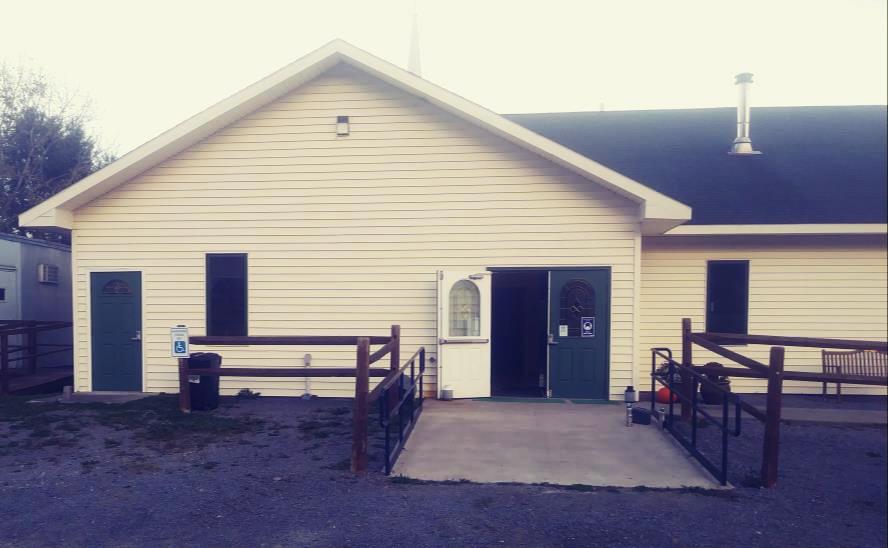
As recommended by the Board, fees for this summer’s six-week day camp would rise from $950 to $975 (2.6%) for Town residents and from $1,250 to $1,300 (4%) for non-resident enrollees.
Newly-established by the ECC Board is a weekly rate: $200 per resident child; $250 for non-residents.
“I don’t think it’s gouging anybody,” ECC President Cortney Bailey said of the increased fees. Bailey noted the State’s minimum wage just rose by $1.00 an hour. With three people working at camp, the salary increase alone, she claimed, hikes costs $120 per week.
The ECC summer camp had some 40 enrollees last year. Organizers hope for 50 this summer. And they assert the Enfield camp’s a bargain. Some well-known day camps near Ithaca, they asserted, charge enrollees as much as $600-$700 per week.
The new rates form part of the ECC’s 2023 budget, set for approval in February.
###
One… Just One… at a Time:
(Jan. 24): At a special meeting Monday night, convened so as to meet a fast-approaching state deadline, the Enfield Town Board approved a second-round application under the Restore NY program to fund demolition of two abandoned properties in the town. Or so it thought.
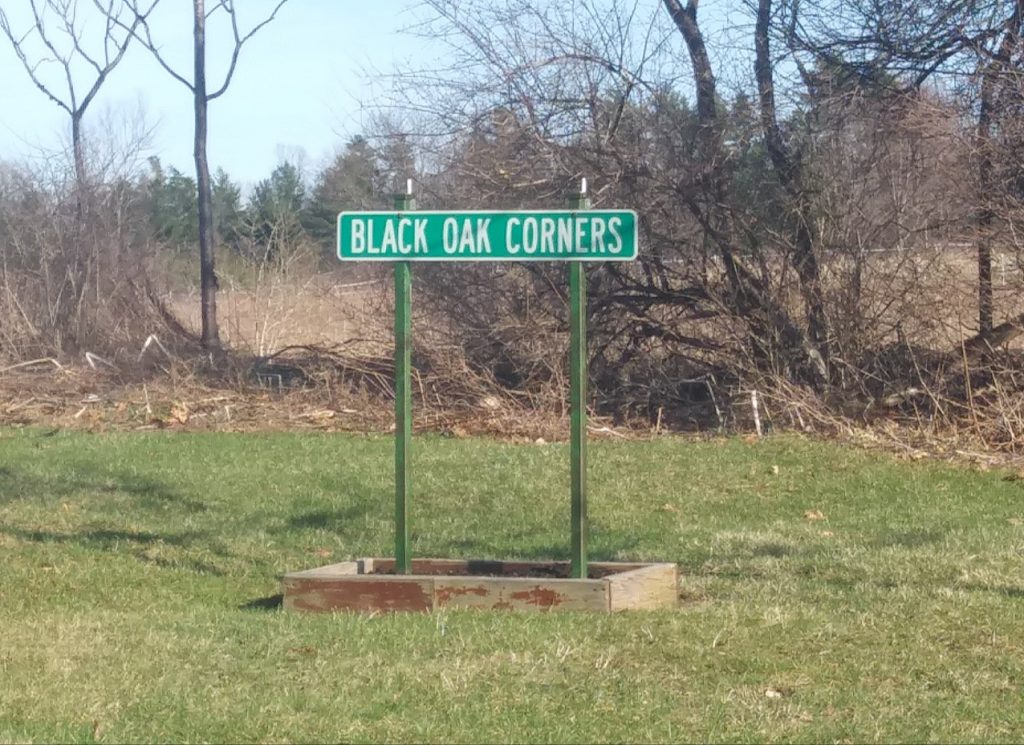
The following morning, Tuesday, Town Supervisor Stephanie Redmond informed Board members that the owner of one of those properties, the one at 198 Black Oak Road, had backed out. Even though the state grant, if approved would pay 90 per cent of the demolition cost, Redmond said the owner declined to support the remaining ten percent, given the likely cost of asbestos removal.
The withdrawal adds credence to the argument, advanced by Highway Superintendent Barry “Buddy” Rollins at Monday’s Public Hearing, that the rewards in curing rural blight may not be worth the Town-paid $500 application fee.
“I have a little problem with the $500,” Rollins said. “The people who buy it (who purchase the vacant lot once the old house is gone) should pay the $500,” Rollins argued. Redmond responded State rules don’t allow that.
Rollins also worried that the building’s removal might actually decrease the parcel’s assessment, thereby reducing Enfield’s tax base.
Still covered by Monday’s Restore NY application is the removal of a vacant building at 329 Connecticut Hill Road.
###
Mr. Brown Goes to Committee:
(Jan. 18): Work by the Community Recovery Fund Advisory Committee is largely done. But watching what remains of that committee could, to say the least, prove “fun.”

“We wanted anyone who wanted to be a part of this committee to be on it,” Shawna Black, Chair of the Tompkins County Legislature, said Tuesday night as she announced her annual reassignment to legislative committees. And because he (most definitely) wants to offer input, Newfield-Enfield rep. Randy Brown became among the seven Black tapped to sit on what’s became this most controversial of legislative committees.
The Advisory Committee grew to an authoritarian gatekeeper last year as it recommended award of $6.5 Million in Community Recovery Fund cash. It’s the program to which Enfield applicants received not one penny. Brown rose as the committee’s most outspoken critic. And he was the only legislator who voted against the group’s final funding package December 20.
Now, the committee’s work stands mostly past-tense. But it must still, as Black said, “check in on the grants that we’ve provided,” and also reallocate any awards that are “not claimed” by their initially-designated recipients.
Brown won’t be the Advisory Committee’s only new member. Also appointed were legislators Mike Sigler and Travis Brooks. They, too, wanted in. They, too, could mix things up. / RL
###
Town Assessment Boards Axed:
(Jan. 18): Securing the bare minimum of eight votes, the Tompkins County Legislature Tuesday suspended, indefinitely, the half-century old practice of convening Town-based Local Boards of Assessment Review that allowed town residents to complain to local officials at their local Town Hall prior to Grievance Day’s final review.
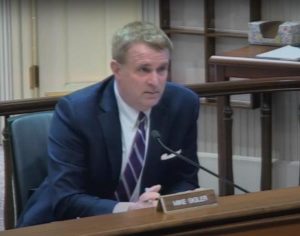
What’s more, at Tuesday’s meeting, Director of Assessment Jay Franklin revealed for the first time that the “Informal Review Meetings” he’s encouraged to replace the Local Boards will this year take place only by telephone, no longer in person; not even on zoom.
Lansing’s Mike Sigler was among four lawmakers who urged the Local Boards be retained.
“These are one of the few times that we give the public an opportunity outside of this actual building, outside of downtown, to come and talk with us,” Sigler said. “It’s another point of engagement.”
###
Good Job, Your Honor:
(Jan. 14): I’ve called it our Town Board’s most boring meeting of the year. Only this time, it really wasn’t.
By each January 20th, New York State requires every Town Board to hail into its meeting room anyone on its team who handles money. It’s called the Annual Audit. We in Enfield conducted ours Friday evening, the 13th. (We’re not superstitious.)
The Town Clerk, the tax collector, and our bookkeeper all presented their papers and answered questions. Everyone’s answers satisfied our checklist.
But what made this year special—albeit bittersweet—was Town Justice Betty Poole’s attendance. Judge Poole retired in December, yet she’s still responsible for last year’s judicial accounting. Dealing with some medical issues these days, Judge Poole appeared via zoom. Her accounts all stood in order. And it gave the Judge and us Board members an opportunity to say a proper goodbye. We did.
We thanked Judge Poole for her service. She thanked us for the opportunity to serve. Betty’s served more than 33 years in local courts. She’d been Enfield Justice since 1994. We will miss her smile, and her firm, yet fair administration of justice; her respect for the Rule of Law.
Audit Meeting adjourned. Enfield marches on. / RL
###
Court Back in Session:
(Jan. 12): After a prolonged delay, and following the retirement of long-time Town Justice Betty Poole in December, the Town of Enfield Justice Court is getting back to a regular schedule.

Town Supervisor Stephanie Redmond announced at the Town Board’s Wednesday night meeting that Judge Thomas Schlee, one of the Town of Ulysses’ two justices, will be assuming temporary duties in Enfield. Schlee will hold court until either the installation of a new Enfield Justice following this November’s elections, or the Town Board’s appointment of a local resident as interim justice before then.
Judge Poole had long held Town Court on Mondays, either in the mornings or evenings. Judge Schlee will move Court to Tuesday evenings, sessions commencing at 6 PM.
Though the position of Court Clerk remains at a judge’s discretion, Redmond also announced Wednesday that Judge Schlee will retain Enfield resident Heather Knutsen-King as his clerk, with Judge Schlee’s Ulysses Court Clerk assisting her, as needed. The Town Board appointed Knutsen-King only in late-December, as Judge Poole’s clerk, her daughter, had also resigned.
###
An End to the Wood Stove
(Jan. 10): If you live in New York State, and you want to buy a wood stove, or an oil furnace, or even a propane heater, better plan on buying it within the next seven years. Because if you don’t, according to Kathy Hochul, Big Government will say you can’t.
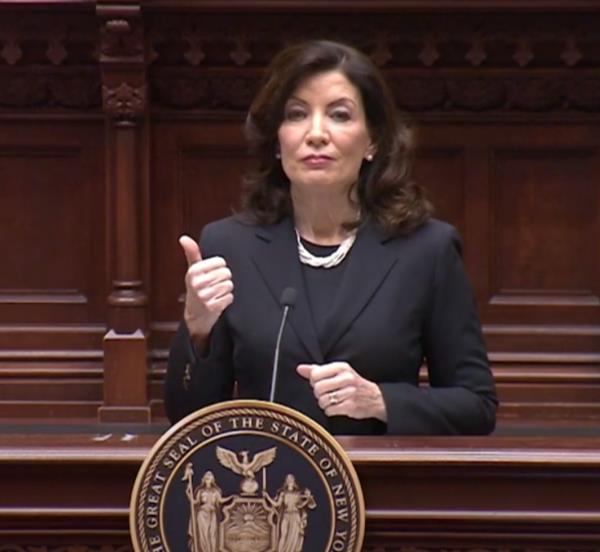
Words mean things. And I take Governor Hochul at her every word. Buried in Hochul’s “State of the State” Address Tuesday, sandwiched among all the aspirational platitudes about mental health, child care, and inflation-ratcheted minimum wages, was this troubling tidbit, Hochul tipping her hat to the Green New Deal:
“To set us on that path, I’m proposing a plan to end the sale of any new fossil-fuel-powered heating equipment by 2030.”
I take Kathy Hochul literally. To me, that means anything that burns oil, or gas… or (even) wood would be banned from sale by the start of the next decade. But there was more:
“And I’m calling for all new construction to be zero-emission, starting in 2025 for small buildings and 2028 for large buildings. We are taking these actions because climate change remains the greatest threat to our planet, and to our children and grandchildren.”
All right. I presume this means the new home you build in two years can only heat with electricity. Again, to me, words mean things.
And to me, they mean something else. At least here in rural upstate, they mean that folks like Lee Zeldin have a good shot at the Governor’s Mansion in 2026. / RL
###
Brock, No; Cantelmo, Yes:
(Jan 10): The best-known member of Ithaca Common Council to those of us living outside the city line has disappointed many of us by declining to reach for higher office.

First Ward Alderperson Cynthia Brock, best known for her lodging of an ethics complaint against former Mayor Svante Myrick and other City officials, has told The Ithaca Voice she will not run to succeed Laura Lewis as Mayor, after Lewis announced her plans last week not to seek a full, four-year term.
Instead, City leaders appear rallying around another Council member, Fifth Ward Alderperson Robert Cantelmo, who Sunday became the first to announce his intensions to run for mayor this fall.
The Voice reports Cantelmo pushed all the right liberal buttons during his campaign rollout, talking up the Green New Deal, affordable housing, and Reimagining Public Safety. Reportedly, many of Cantelmo’s Council colleagues attended his announcement, Brock included. Lewis was not there.
But the mayor elected this fall will be a weak mayor. Ithaca switches to a City Manager government in 2024 making its top political position more ceremonial than administrative.
###
Psst: Hochul Signed It:
(Jan. 8): You won’t find it in any Kathy Hochul press release. Nor did she mention it in her Inaugural Address. Assemblymember Anna Kelles didn’t touch on it in her weekly online update. (Kelles’ last posted news release was in March.) And Senator Lea Webb’s official site is still bear naked.

So much for news. But a scant few media outlets reported it New Year’s Day. Governor Hochul New Year’s Eve quietly signed the lame-duck-passed law granting State Senators and Assembly members a 29 per cent pay raise.
As far as one knows, Hochul has yet to comment on the action she took. Two days before Christmas, Hochul was abrupt. “I have many bills on my desk … so I will address that in proper time,” was about all she then said. I guess she did address that bill. Then she sealed her lips.
But Albany Republicans are talking. Not a single GOP legislator supported raising legislative pay from $110,000 to $142,000 annually. Here’s what Assemblyman Michael Lawler tweeted, according to the New York Post: “If Hochul had any political courage, she would not only veto the ridiculous $32,000 pay raise, she would have called us back for a special session to deal with the disastrous cashless bail.” Amen. / RL
###
Ithaca’s Musical Mayors:
(Jan. 6): She read from a script. She seldom looked up. She spoke in a monotone. And she buried the lead.
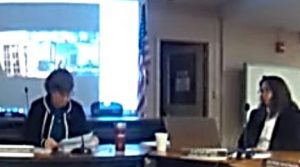
Newly-installed Ithaca Mayor Laura Lewis’ “State of the City” address Wednesday night was anything but inspiring. It was hardly a stem-winder. And eleven minutes into her 15-minute dry-as-a-desert recitation of supposed urban milestones and hard-fought accomplishments, Lewis dropped a political bombshell that landed with a thud. Though just elected to complete the final year of Mayor Svante Myrick’s unfinished term, the newly-installed Lewis announced she will not seek re-election this fall to remain mayor beyond December.
“For the past five years, it has been my privilege and continues to be my greatest honor to serve the city I love as Councilmember, and now as Mayor,” Lewis read, head down, at Common Council’s first-of-year session. “I look forward to the many challenges and opportunities we will face together throughout 2023. However, I’m announcing tonight that I will not be seeking reelection to the position of mayor in 2024.”
There. Thud. Lewis gave no reason for her taking the shortest of mayoral paths. But I bet Katie Sims and Zach Winn would love to have known her intentions when they campaigned against her last November.
Still, in 2024, the job of Ithaca Mayor will become a far cry from what it was back in Ed Conley’s glory days. Next year, a City Manager will take the helm, and the elected mayor becomes relegated to Chief Meeting Chair and Baby-Kisser. Maybe Laura Lewis knows that. Or maybe that in a city with rising crime, labor strife, ethics probes, and here-today, gone-tomorrow chiefs of police, it’s best to get out while the getting’s good.
Laura Lewis: City Hall’s latest, year-long Lame Duck, and in a place that starves for real leadership. In a way, it’s rather fitting. But in another, it’s kind of sad. Ithaca, Good Luck. / RL
###
Calculator Democracy?
(Jan. 6): “I hate it,” Dryden’s Mike Lane said of weighted voting Thursday. Yet Lane, a constitutional purest, wants to see it, at least temporarily, in the Tompkins County Legislature.
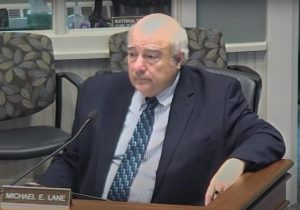
At a meeting of the Government Operations Committee January 5th, Lane pushed hard to impose a weighted voting scheme from now through the 2025 elections. It would only be then that redistricting from the 2020 Census will finally reshape district lines and balance representational populations.
Quest for power does not drive the Dryden Democrat’s calculator-intensive initiative. A spreadsheet Lane shared with the committee showed he would be one of two legislators to forfeit the most influence. Lane would only cast 85 per cent of a vote.
Enfield and Newfield’s influence would also fall. Anne Koreman would cast 99% of a vote; Randy Brown, 96%. Three Ithaca City districts would gain the most. Rich John’s vote would weigh-in at nearly 119%.
“The people in Tompkins County have not been equally represented,” Lane reflected. He faulted legislators for not shortening their current terms to allow constituent equity to take hold sooner. “And we are open to a lawsuit,” Lane warned.
Others, notably committee chair Amanda Champion—who would actually gain influence under the change—are more willing to kick the can down the road, gather information first, and not bring Lane’s resolution to the floor next month, as he’d like. “I would not entertain a resolution at that time,” Champion said.
What’s more, by February, committee assignments could change. Lane may be off the committee; or for that matter, maybe Champion as well.
###

